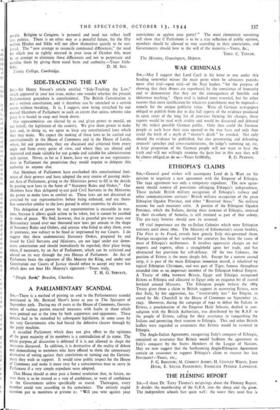ETHIOPIA'S CLAIMS
Sin,—General good wishes will accompany Lord de la Warr on his mission to negotiate a new agreement with the Emperor of Ethiopia. The 1942 agreement was only a temporary expedient. The new agree- ment should remove all provisions infringing Ethiopia's independence. These include British military occupation of Ethiopia's railway and other communications services: British military occupation of the great Ethiopian Ogaden Province, and other "Reserved Areas." No military reasons for such measures exist. A portion of the Ethiopian Ogaden Province, which the Italians, during their invtsion of Ethiopia, annexed to their ex-colony of Somalia, is still retained as part of that colony. The pre-1935 frontier should now be restored.
Of vital importance are the ex-Italian Colonies which were Ethiopian territory until about 589o. The Ministry of Information's recent booklet, The First to be Freed, reveals how grossly Italy mis-governed them. Foreign occupation of her seaboard for centuries has been the cause of most of Ethiopia's misfortunes. It involves oppressive charges on her imports and exports, often a stranglehold upon her trade, and has obstructed her provision for self-defence. Of the two Colonies, the position of Eritrea is the more deeply felt. Except for a narrow coastal strip, it is part of the main Ethiopian mountain massif, is inhabited by typical Ethiopian Christians, and was part of Tigre, famous throughout recorded time as an important member of the Ethiopian federal Empire. A Treaty of -1884 between Britain, Egypt and Ethiopia recognised Eritrea as Ethiopia and allocated to Egypt only an exiguous bit of coastal lowland around Massawa. The Ethiopian people believe the 1884 Treaty gives them a claim to British support in recovering Eritrea, now that Italy, by her aggression, has " irretrievably lost " her Empire, as stated by Mr. Churchill in the House of Commons on September 21, 1943. Moreover, during the campaign of 1941 to defeat the Italians in Eritrea, a proclamation of the Emperor Haile Selassie, drafted in con- sultation with the British Authorities, was distributed by the R.A.F. to the people of Eritrea, calling for their assistance in vanquishing the Italians and promising their reunion to Ethiopia. This and other British leaflets were regarded as assurances that Eritrea would be restored to Ethiopia.
The Anglo-Italian Agreement, recognising Italy's conquest of Ethiopia, contained an assurance that Britain would facilitate the agreement to Italy's conquest by the States Members of the League of Nations. May we now suggest that the forthcoming Anglo-Ethiopian Agreement contain an assurance to support Ethiopia's claim to recover her lost Provinces?—Yours, etc.,
P. G. BARSTOW; M. CORBETT ASHBY; H. COSTLEY WHITE; JOHN HYND; E. SYLVIA PANKHURST; EMMELINE PETHICK .LAWRENCE.


























 Previous page
Previous page